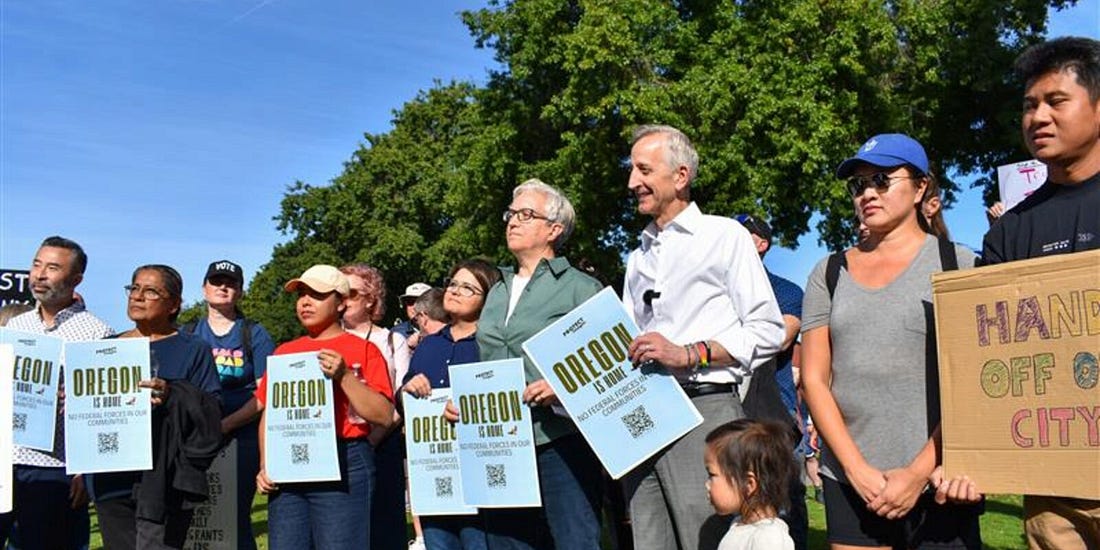|
 |
Trump's Power Grab is Headed for the Supreme Court
The Seventh and Ninth Circuit decisions on Trump's National Guard Deployments
Trump’s ask is on its way to the Supreme Court. He wants to have the ability to deploy military troops on American streets, despite the history and tradition, to say nothing of the law, in this country, which reserves police powers to the states absent extraordinary circumstances. Trump wants to be able to use fabricated claims of out-of-control crime to justify an unprecedented power grab by an American president, one that has dangerous overtones when considered in the context of the midterm elections.
Sunday night, we discussed Trump’s plans to use the National Guard for domestic law enforcement purposes and the Seventh Circuit’s decision that he could not deploy them to Chicago. Monday, the Ninth Circuit’s decision, as expected after oral argument, went the other way, holding that Trump’s plan to deploy the Guard to Portland was lawful. The decision was 2-1. The majority ruled that sending 200 troops to protect the federal building for 60 days was a “proportional response” to the crime issues Trump believes exist in the city.
Writing in dissent, the third judge on the panel took a different view. Judge Susan Graber wrote, “We have come to expect a dose of political theater in the political branches, drama designed to rally the base or to rile or intimidate political opponents. We also may expect there a measure of bending—sometimes breaking—the truth. By design of the Founders, the judicial branch stands apart. We rule on facts, not on supposition or conjecture, and certainly not on fabrication or propaganda. I urge my colleagues on this court to act swiftly to vacate the majority’s order before the illegal deployment of troops under false pretenses can occur. Above all, I ask those who are watching this case unfold to retain faith in our judicial system for just a little longer.”
On Wednesday, the Ninth Circuit, where a panel previously reversed a decision by a California federal Judge, Charles Breyer, limiting the deployment of Guard troops in California, declined to rehear that decision en banc, permitting it to stand and the administration to proceed.
Now, we wait to see whether there will be a different decision in the Oregon case. That seems possible, particularly given Judge Graber’s invitation to the court and the facts, which make the state’s position against the federal government stronger than in the California case. But it’s worth noting that the Ninth Circuit, which used to be the most liberal circuit in the country, was remade during the first Trump administration. It’s possible they will let both the California and Oregon decisions in the administration’s favor stand.
Either way, two critically important issues are headed to the Supreme Court:
The scope of presidential power to federalize and deploy National Guard troops, and,
Whether a president’s decision that such a move is merited is effectively unreviewable by the courts, as Trump alleges,
That’s the heart of the matter. These cases are part of Trump’s drive to make the executive more powerful and to have that power come at the expense of the courts, Congress, and the people. If Trump can deploy troops on American streets at will, then our democracy will be immeasurably weakened.
The Supreme Court will have to confront an 1827 case, Martin v. Mott, where the Supreme Court held that “the authority to decide whether the exigency has arisen [to call up state militias] belongs exclusively to the president, and that his decision is conclusive upon all other persons.” That’s the basis for Trump’s position, in the petition asking the Court to reverse the Chicago case, for arguing that the courts can’t review the president’s decisions. But it’s a misinterpretation of Mott, which considered whether militiamen could second-guess a president’s decisions, not whether judges could engage in judicial review, the critical function performed by the Article III branch of government. If the Supreme Court is committed to history and tradition, as they have frequently said they are these past few years, and if they want to avoid writing their branch of government out of the equation, then they must stand for the proposition that judicial review of decisions made by the executive branch is sacrosanct and essential to democracy, and the president’s assertion that no one can vet the constitutionality of his decisions is simply wrong.
We’ve discussed that the parade of horribles this administration shoots at high velocity towards the American public, leaving us feeling overwhelmed. It’s an intentional tactic used by would-be dictators—flood the zone so that people find it difficult to pay attention and easier to tune out. This issue is one of the most important ones we face, and it’s essential that we pay attention to it, no matter what else is going on. We are likely to learn more this week as the courts sort out how they will proceed. Trump has set his sights on San Francisco despite Mayor Daniel Lurie’s protestation that “This is a safe American city.” That doesn’t seem to matter to the president, who has said he wants to use cities under Democratic leadership, which he describes as “dangerous” as “training grounds” for the military. Trump says blue cities are “the enemy within” and that contrary to two plus centuries of American law and practice, he should be allowed to use armed forces for domestic civilian law enforcement.
We have rarely faced a more serious moment.
We’re in this together,
Joyce
Your paid subscription makes Civil Discourse possible—independent, informed analysis that connects the dots between law, politics, and the truth. In a moment when noise drowns out reason, your support ensures facts and context still have a home. Join a community that refuses to give up on democracy—or on understanding it.

